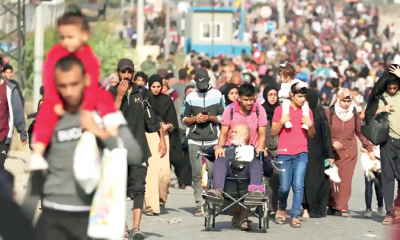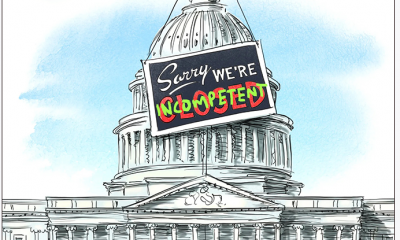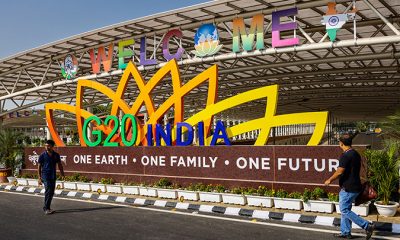Features
Prime privatisation; vandalism in Paradise Lost

Cassandra received an email a couple of days ago, parts of which she quotes below, after googling to verify facts.  A news item on Monday 24th moved her hand to do this; the news being that Sri Lankan is flying at a loss. No surprise; known for a long while. What stunned Cass, however, was the billions of debt incurred for these three months of the year. In contrast see what India has done. India will be hosting the 2023 G20 Summit of 20 member nations in New Delhi in September and Biden is scheduled to visit the country. Yes, VIP nations are scrambling to further good relations with India, with respect to the country and its economic advancement. On the other hand, the Teardrop that hangs at its bottom from being serendipitous and doing well, has been pushed to be a failed state, looked askance at, or if pitied and considered worth being charitable to, treated with a handout or two.
A news item on Monday 24th moved her hand to do this; the news being that Sri Lankan is flying at a loss. No surprise; known for a long while. What stunned Cass, however, was the billions of debt incurred for these three months of the year. In contrast see what India has done. India will be hosting the 2023 G20 Summit of 20 member nations in New Delhi in September and Biden is scheduled to visit the country. Yes, VIP nations are scrambling to further good relations with India, with respect to the country and its economic advancement. On the other hand, the Teardrop that hangs at its bottom from being serendipitous and doing well, has been pushed to be a failed state, looked askance at, or if pitied and considered worth being charitable to, treated with a handout or two.
So here quoted is a para or two from the email received. “Air India announced on February 14 that it had placed orders for 470 Airbus and Boeing aircraft. It is being touted as the largest purchase in commercial aviation history.” (Monday 24 Lankan news said most of Sri Lankan planes, on loan, were undergoing repairs).
To continue quoting, “This is a classic story that highlights the transition from a state-owned loss making, corrupt and inept organisation to a private entity that has assessed the market and has made acquisitions to build up the business… India’s national carrier, Air India, was officially handed over to the Tata group on January 2022. The handover ends a years-long attempt to sell Air India, which has raked up losses worth $9.5bn. The national carrier was founded by JRD Tata in 1932 and nationalised in 1953. The acquisition is the country’s most high-profile privatisation under PM Narendra Modi and ends decades of losses and bailouts for Air India.”
Over here
And what pertains in this country apart from Sri Lankan Airline’s flabbergasting losses? A sinister drama involving a past AG who dared say there seemed to be a hidden hand in the Easter 2019 attacks on churches and hotels. He and his home have been targeted by, it has to be assumed, goons ordered by someone high up.
The second most pressing issue is obtaining compensation from the owners of a ship loaded with nitric acid and plastic catching fire and sinking in our most precious sea. The Minister of Justice himself has given info he got that directs to an act of corruption that is almost impossible to believe: that someone or some group wanted to reduce the amount asked for in damages and earned a tidy pile of dollars, supposedly deposited in a bank in England. Far too complicated for Cassandra to even comment on. A claim for damages properly put through could have got billions of dollars to our Treasury because our sea was vastly detrimentally damaged. Cass’ only comment is that not even the devil himself, Satan or Mara would do the bankrupt country such damage as to have the amount sought in compensation, and given, reduced. So, if what the Minister was told is true, there walk and live (well we suppose) Sri Lankans who are worse than the devil in whatever manifestation he appears.
Very probably these two serious issues will remain unsolved. Who loses? Sri Lanka and its people. Who gains colossally? Your guess is as good as poor Cassandra’s.
General lack of public spiritedness
The term ‘public spiritedness’ is here used by Cass to mean “having or showing active interest in public welfare or the good of the community.”
Steering clear of political happenings and dangerous ground, Cassandra moves to a subject that needs to be impressed on people. It is the total lack of public spiritedness which connotes disregard for public property – its correct use and care given – that has to improve. As school kids we had it dinned in our heads to have respect for public property which meant proper use of utilities provided, with care and caution not to damage in any way. I still clearly remember our first Ceylonese Principal in our Kandy school announcing at the school assembly that every student should be public spirited and for example, use a toilet and vacate the room spotlessly clean and with not even a drop of water on the floor.
Cass has often complained about noise and misbehaviour in places of worship, more especially of Buddhist veneration. The precincts of the most sacred Bo Tree in Anuradhapura are never silent; either kapuralas are chanting asking for favours for supplicants from god knows where. The Bodiya is to be venerated in silence; Buddha’s enlightenment remembered with gratitude; and reflection on one’s seela and Samadhi. Often poojas in the vihara below are loudspeakers blasting whatever little quiet there is.
I narrate two stories relevant to prove how badly people use public amenities and spaces.Two nieces braved a pilgrimage to Anuradhapura by public transport. The air-conditioned bus was fine. On reaching their destination, they needed to freshen up. Intending to go to a hotel they saw a very well-facaded set of public toilets. So, they decided to go in. The outside was completely fallacious as regards the inside. It was originally fitted superbly but within, toilet seats were broken, flushes damaged, the ground wet and atrociously smelly. A large mirror was badly cracked. The surmising was that only a deliberate act of vandalism could cause such damage to it.
The next story involves is what a European diplomat in Sri Lanka; narrated to me, hence believable. He and his driver were travelling to Nuwara Eliya, when they had to be behind an open vehicle that was carrying merry makers. The men were seen to be drinking and the women and kids singing. Then one man threw an emptied arrack bottle to the tea estate beside the road. The diplomat, highly angered, ordered the driver to overtake the vehicle which took some time on that hilly terrain. Once overtaken, he ordered that the vehicle be blocked. Mr DPL got down, went up to the van and told them they had to retrieve the thrown bottle and that if they did not do so, he would get the police to helicopter to the spot. Consternation resulted with the men becoming restive and the woman shouting at them to do as told. Both vehicles turned back and the bottle was retrieved. Conclusion is a question. Did the men learn a lesson and dispose of litter in a correct manner thenceforth? Not possible to believe since this careless use of public amenities and even space is ingrained and imbibed in our people from birth.
Sri Pada is a spot of sanctity, beauty, sheer majesty and popular during its season. After the season the area is combed to collect and dispose of rubbish carelessly flung aside. Hillocks of trash are made; such the indifference of people to the environment and keeping premises clean. Pickpockets too are co-trampers up the hill, such that hundreds of emptied purses are found strewn in the underbrush below.
When will Sri Lankans learn to keep their environments and surroundings clean and free of carelessly flung rubbish? Does it have to take strict authoritarianism to insist on decency?
Welcome news items
Heartening news was that a brand new, posh OPD section for the general hospital was gifted by the Govt of China. Great relief when the Chinese Ambassador said it was an outright gift from his great country to us poor failed state. How very sad that last is, but true, driven to it by satanic political leaders and top administrators. Here the Chinese helped with immense loans being given.
A most heart-warming news item was US Ambassador who is ever moving and mingling with common folk, Julie J Chung, graciously chatting and showing genuine amity meeting farmers and, more specially their wives, in Anuradhapura. A woman farmer said that due to the huge America gift of fertiliser delivered to them, the next harvest would assuredly be bountiful.
That is the way matters must be done: give in kind to the needy people: patients and farmers in the two bright news above. Never give money through high ups. There is a rampant disease among them called corruption. Only minus is that when this disease takes hold, the person thrives, girths increase and they live happy as ever. Cass adds – notwithstanding our curses.
Ambitious octogenarian
President Biden has announced his plans to run for re-election in 2024. If he wins, he will be 82 and 86 when his term ends. Trump who has also announced his candidature is close in age – 78 in 2024. Biden is already the oldest to be Prez. He is said to be a ‘healthy, vigorous 80-year-old’ although he has been treated for this and that including a slow growing skin cancer. He has had no major medical problems; doesn’t smoke or drink and exercises regularly. But very recently he was camera caught napping during important meetings, even when the Russian diplomat was addressing the UN.
Does this mean there is no chance that a descendant from an Indian parent will be head of the US, matching how it is across the Atlantic in the British Isles? In any case her popularity has declined, it is averred.
Features
The heart-friendly health minister

by Dr Gotabhya Ranasinghe
Senior Consultant Cardiologist
National Hospital Sri Lanka
When we sought a meeting with Hon Dr. Ramesh Pathirana, Minister of Health, he graciously cleared his busy schedule to accommodate us. Renowned for his attentive listening and deep understanding, Minister Pathirana is dedicated to advancing the health sector. His openness and transparency exemplify the qualities of an exemplary politician and minister.
Dr. Palitha Mahipala, the current Health Secretary, demonstrates both commendable enthusiasm and unwavering support. This combination of attributes makes him a highly compatible colleague for the esteemed Minister of Health.
Our discussion centered on a project that has been in the works for the past 30 years, one that no other minister had managed to advance.
Minister Pathirana, however, recognized the project’s significance and its potential to revolutionize care for heart patients.
The project involves the construction of a state-of-the-art facility at the premises of the National Hospital Colombo. The project’s location within the premises of the National Hospital underscores its importance and relevance to the healthcare infrastructure of the nation.
This facility will include a cardiology building and a tertiary care center, equipped with the latest technology to handle and treat all types of heart-related conditions and surgeries.
Securing funding was a major milestone for this initiative. Minister Pathirana successfully obtained approval for a $40 billion loan from the Asian Development Bank. With the funding in place, the foundation stone is scheduled to be laid in September this year, and construction will begin in January 2025.
This project guarantees a consistent and uninterrupted supply of stents and related medications for heart patients. As a result, patients will have timely access to essential medical supplies during their treatment and recovery. By securing these critical resources, the project aims to enhance patient outcomes, minimize treatment delays, and maintain the highest standards of cardiac care.
Upon its fruition, this monumental building will serve as a beacon of hope and healing, symbolizing the unwavering dedication to improving patient outcomes and fostering a healthier society.We anticipate a future marked by significant progress and positive outcomes in Sri Lanka’s cardiovascular treatment landscape within the foreseeable timeframe.
Features
A LOVING TRIBUTE TO JESUIT FR. ALOYSIUS PIERIS ON HIS 90th BIRTHDAY

by Fr. Emmanuel Fernando, OMI
Jesuit Fr. Aloysius Pieris (affectionately called Fr. Aloy) celebrated his 90th birthday on April 9, 2024 and I, as the editor of our Oblate Journal, THE MISSIONARY OBLATE had gone to press by that time. Immediately I decided to publish an article, appreciating the untiring selfless services he continues to offer for inter-Faith dialogue, the renewal of the Catholic Church, his concern for the poor and the suffering Sri Lankan masses and to me, the present writer.
It was in 1988, when I was appointed Director of the Oblate Scholastics at Ampitiya by the then Oblate Provincial Fr. Anselm Silva, that I came to know Fr. Aloy more closely. Knowing well his expertise in matters spiritual, theological, Indological and pastoral, and with the collaborative spirit of my companion-formators, our Oblate Scholastics were sent to Tulana, the Research and Encounter Centre, Kelaniya, of which he is the Founder-Director, for ‘exposure-programmes’ on matters spiritual, biblical, theological and pastoral. Some of these dimensions according to my view and that of my companion-formators, were not available at the National Seminary, Ampitiya.
Ever since that time, our Oblate formators/ accompaniers at the Oblate Scholasticate, Ampitiya , have continued to send our Oblate Scholastics to Tulana Centre for deepening their insights and convictions regarding matters needed to serve the people in today’s context. Fr. Aloy also had tried very enthusiastically with the Oblate team headed by Frs. Oswald Firth and Clement Waidyasekara to begin a Theologate, directed by the Religious Congregations in Sri Lanka, for the contextual formation/ accompaniment of their members. It should very well be a desired goal of the Leaders / Provincials of the Religious Congregations.
Besides being a formator/accompanier at the Oblate Scholasticate, I was entrusted also with the task of editing and publishing our Oblate journal, ‘The Missionary Oblate’. To maintain the quality of the journal I continue to depend on Fr. Aloy for his thought-provoking and stimulating articles on Biblical Spirituality, Biblical Theology and Ecclesiology. I am very grateful to him for his generous assistance. Of late, his writings on renewal of the Church, initiated by Pope St. John XX111 and continued by Pope Francis through the Synodal path, published in our Oblate journal, enable our readers to focus their attention also on the needed renewal in the Catholic Church in Sri Lanka. Fr. Aloy appreciated very much the Synodal path adopted by the Jesuit Pope Francis for the renewal of the Church, rooted very much on prayerful discernment. In my Religious and presbyteral life, Fr.Aloy continues to be my spiritual animator / guide and ongoing formator / acccompanier.
Fr. Aloysius Pieris, BA Hons (Lond), LPh (SHC, India), STL (PFT, Naples), PhD (SLU/VC), ThD (Tilburg), D.Ltt (KU), has been one of the eminent Asian theologians well recognized internationally and one who has lectured and held visiting chairs in many universities both in the West and in the East. Many members of Religious Congregations from Asian countries have benefited from his lectures and guidance in the East Asian Pastoral Institute (EAPI) in Manila, Philippines. He had been a Theologian consulted by the Federation of Asian Bishops’ Conferences for many years. During his professorship at the Gregorian University in Rome, he was called to be a member of a special group of advisers on other religions consulted by Pope Paul VI.
Fr. Aloy is the author of more than 30 books and well over 500 Research Papers. Some of his books and articles have been translated and published in several countries. Among those books, one can find the following: 1) The Genesis of an Asian Theology of Liberation (An Autobiographical Excursus on the Art of Theologising in Asia, 2) An Asian Theology of Liberation, 3) Providential Timeliness of Vatican 11 (a long-overdue halt to a scandalous millennium, 4) Give Vatican 11 a chance, 5) Leadership in the Church, 6) Relishing our faith in working for justice (Themes for study and discussion), 7) A Message meant mainly, not exclusively for Jesuits (Background information necessary for helping Francis renew the Church), 8) Lent in Lanka (Reflections and Resolutions, 9) Love meets wisdom (A Christian Experience of Buddhism, 10) Fire and Water 11) God’s Reign for God’s poor, 12) Our Unhiddden Agenda (How we Jesuits work, pray and form our men). He is also the Editor of two journals, Vagdevi, Journal of Religious Reflection and Dialogue, New Series.
Fr. Aloy has a BA in Pali and Sanskrit from the University of London and a Ph.D in Buddhist Philosophy from the University of Sri Lankan, Vidyodaya Campus. On Nov. 23, 2019, he was awarded the prestigious honorary Doctorate of Literature (D.Litt) by the Chancellor of the University of Kelaniya, the Most Venerable Welamitiyawe Dharmakirthi Sri Kusala Dhamma Thera.
Fr. Aloy continues to be a promoter of Gospel values and virtues. Justice as a constitutive dimension of love and social concern for the downtrodden masses are very much noted in his life and work. He had very much appreciated the commitment of the late Fr. Joseph (Joe) Fernando, the National Director of the Social and Economic Centre (SEDEC) for the poor.
In Sri Lanka, a few religious Congregations – the Good Shepherd Sisters, the Christian Brothers, the Marist Brothers and the Oblates – have invited him to animate their members especially during their Provincial Congresses, Chapters and International Conferences. The mainline Christian Churches also have sought his advice and followed his seminars. I, for one, regret very much, that the Sri Lankan authorities of the Catholic Church –today’s Hierarchy—- have not sought Fr.
Aloy’s expertise for the renewal of the Catholic Church in Sri Lanka and thus have not benefited from the immense store of wisdom and insight that he can offer to our local Church while the Sri Lankan bishops who governed the Catholic church in the immediate aftermath of the Second Vatican Council (Edmund Fernando OMI, Anthony de Saram, Leo Nanayakkara OSB, Frank Marcus Fernando, Paul Perera,) visited him and consulted him on many matters. Among the Tamil Bishops, Bishop Rayappu Joseph was keeping close contact with him and Bishop J. Deogupillai hosted him and his team visiting him after the horrible Black July massacre of Tamils.
Features
A fairy tale, success or debacle

Sri Lanka-Singapore Free Trade Agreement
By Gomi Senadhira
senadhiragomi@gmail.com
“You might tell fairy tales, but the progress of a country cannot be achieved through such narratives. A country cannot be developed by making false promises. The country moved backward because of the electoral promises made by political parties throughout time. We have witnessed that the ultimate result of this is the country becoming bankrupt. Unfortunately, many segments of the population have not come to realize this yet.” – President Ranil Wickremesinghe, 2024 Budget speech
Any Sri Lankan would agree with the above words of President Wickremesinghe on the false promises our politicians and officials make and the fairy tales they narrate which bankrupted this country. So, to understand this, let’s look at one such fairy tale with lots of false promises; Ranil Wickremesinghe’s greatest achievement in the area of international trade and investment promotion during the Yahapalana period, Sri Lanka-Singapore Free Trade Agreement (SLSFTA).
It is appropriate and timely to do it now as Finance Minister Wickremesinghe has just presented to parliament a bill on the National Policy on Economic Transformation which includes the establishment of an Office for International Trade and the Sri Lanka Institute of Economics and International Trade.
Was SLSFTA a “Cleverly negotiated Free Trade Agreement” as stated by the (former) Minister of Development Strategies and International Trade Malik Samarawickrama during the Parliamentary Debate on the SLSFTA in July 2018, or a colossal blunder covered up with lies, false promises, and fairy tales? After SLSFTA was signed there were a number of fairy tales published on this agreement by the Ministry of Development Strategies and International, Institute of Policy Studies, and others.
However, for this article, I would like to limit my comments to the speech by Minister Samarawickrama during the Parliamentary Debate, and the two most important areas in the agreement which were covered up with lies, fairy tales, and false promises, namely: revenue loss for Sri Lanka and Investment from Singapore. On the other important area, “Waste products dumping” I do not want to comment here as I have written extensively on the issue.
1. The revenue loss
During the Parliamentary Debate in July 2018, Minister Samarawickrama stated “…. let me reiterate that this FTA with Singapore has been very cleverly negotiated by us…. The liberalisation programme under this FTA has been carefully designed to have the least impact on domestic industry and revenue collection. We have included all revenue sensitive items in the negative list of items which will not be subject to removal of tariff. Therefore, 97.8% revenue from Customs duty is protected. Our tariff liberalisation will take place over a period of 12-15 years! In fact, the revenue earned through tariffs on goods imported from Singapore last year was Rs. 35 billion.
The revenue loss for over the next 15 years due to the FTA is only Rs. 733 million– which when annualised, on average, is just Rs. 51 million. That is just 0.14% per year! So anyone who claims the Singapore FTA causes revenue loss to the Government cannot do basic arithmetic! Mr. Speaker, in conclusion, I call on my fellow members of this House – don’t mislead the public with baseless criticism that is not grounded in facts. Don’t look at petty politics and use these issues for your own political survival.”
I was surprised to read the minister’s speech because an article published in January 2018 in “The Straits Times“, based on information released by the Singaporean Negotiators stated, “…. With the FTA, tariff savings for Singapore exports are estimated to hit $10 million annually“.
As the annual tariff savings (that is the revenue loss for Sri Lanka) calculated by the Singaporean Negotiators, Singaporean $ 10 million (Sri Lankan rupees 1,200 million in 2018) was way above the rupees’ 733 million revenue loss for 15 years estimated by the Sri Lankan negotiators, it was clear to any observer that one of the parties to the agreement had not done the basic arithmetic!
Six years later, according to a report published by “The Morning” newspaper, speaking at the Committee on Public Finance (COPF) on 7th May 2024, Mr Samarawickrama’s chief trade negotiator K.J. Weerasinghehad had admitted “…. that forecasted revenue loss for the Government of Sri Lanka through the Singapore FTA is Rs. 450 million in 2023 and Rs. 1.3 billion in 2024.”
If these numbers are correct, as tariff liberalisation under the SLSFTA has just started, we will pass Rs 2 billion very soon. Then, the question is how Sri Lanka’s trade negotiators made such a colossal blunder. Didn’t they do their basic arithmetic? If they didn’t know how to do basic arithmetic they should have at least done their basic readings. For example, the headline of the article published in The Straits Times in January 2018 was “Singapore, Sri Lanka sign FTA, annual savings of $10m expected”.
Anyway, as Sri Lanka’s chief negotiator reiterated at the COPF meeting that “…. since 99% of the tariffs in Singapore have zero rates of duty, Sri Lanka has agreed on 80% tariff liberalisation over a period of 15 years while expecting Singapore investments to address the imbalance in trade,” let’s turn towards investment.
Investment from Singapore
In July 2018, speaking during the Parliamentary Debate on the FTA this is what Minister Malik Samarawickrama stated on investment from Singapore, “Already, thanks to this FTA, in just the past two-and-a-half months since the agreement came into effect we have received a proposal from Singapore for investment amounting to $ 14.8 billion in an oil refinery for export of petroleum products. In addition, we have proposals for a steel manufacturing plant for exports ($ 1 billion investment), flour milling plant ($ 50 million), sugar refinery ($ 200 million). This adds up to more than $ 16.05 billion in the pipeline on these projects alone.
And all of these projects will create thousands of more jobs for our people. In principle approval has already been granted by the BOI and the investors are awaiting the release of land the environmental approvals to commence the project.
I request the Opposition and those with vested interests to change their narrow-minded thinking and join us to develop our country. We must always look at what is best for the whole community, not just the few who may oppose. We owe it to our people to courageously take decisions that will change their lives for the better.”
According to the media report I quoted earlier, speaking at the Committee on Public Finance (COPF) Chief Negotiator Weerasinghe has admitted that Sri Lanka was not happy with overall Singapore investments that have come in the past few years in return for the trade liberalisation under the Singapore-Sri Lanka Free Trade Agreement. He has added that between 2021 and 2023 the total investment from Singapore had been around $162 million!
What happened to those projects worth $16 billion negotiated, thanks to the SLSFTA, in just the two-and-a-half months after the agreement came into effect and approved by the BOI? I do not know about the steel manufacturing plant for exports ($ 1 billion investment), flour milling plant ($ 50 million) and sugar refinery ($ 200 million).
However, story of the multibillion-dollar investment in the Petroleum Refinery unfolded in a manner that would qualify it as the best fairy tale with false promises presented by our politicians and the officials, prior to 2019 elections.
Though many Sri Lankans got to know, through the media which repeatedly highlighted a plethora of issues surrounding the project and the questionable credentials of the Singaporean investor, the construction work on the Mirrijiwela Oil Refinery along with the cement factory began on the24th of March 2019 with a bang and Minister Ranil Wickremesinghe and his ministers along with the foreign and local dignitaries laid the foundation stones.
That was few months before the 2019 Presidential elections. Inaugurating the construction work Prime Minister Ranil Wickremesinghe said the projects will create thousands of job opportunities in the area and surrounding districts.
The oil refinery, which was to be built over 200 acres of land, with the capacity to refine 200,000 barrels of crude oil per day, was to generate US$7 billion of exports and create 1,500 direct and 3,000 indirect jobs. The construction of the refinery was to be completed in 44 months. Four years later, in August 2023 the Cabinet of Ministers approved the proposal presented by President Ranil Wickremesinghe to cancel the agreement with the investors of the refinery as the project has not been implemented! Can they explain to the country how much money was wasted to produce that fairy tale?
It is obvious that the President, ministers, and officials had made huge blunders and had deliberately misled the public and the parliament on the revenue loss and potential investment from SLSFTA with fairy tales and false promises.
As the president himself said, a country cannot be developed by making false promises or with fairy tales and these false promises and fairy tales had bankrupted the country. “Unfortunately, many segments of the population have not come to realize this yet”.
(The writer, a specialist and an activist on trade and development issues . )
























